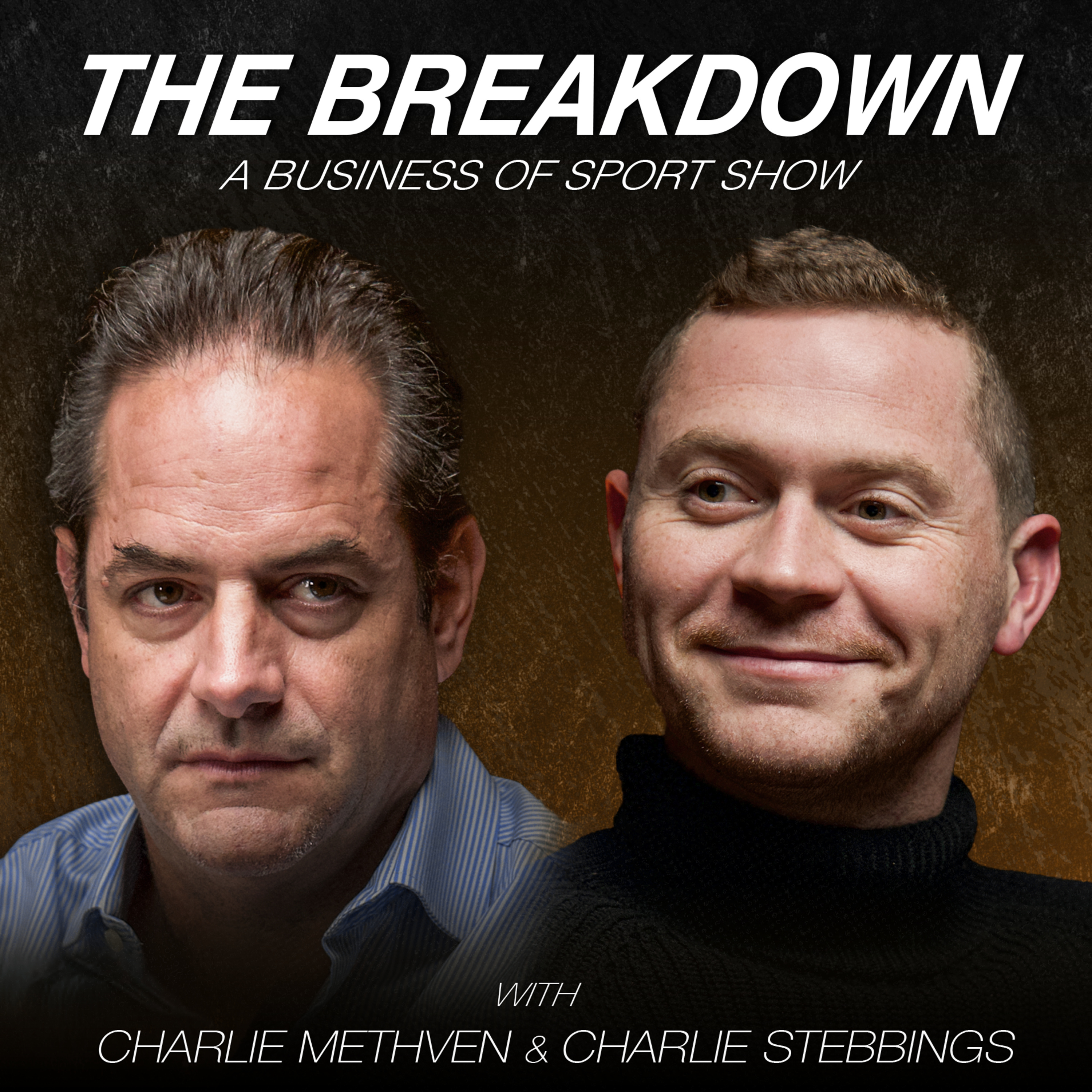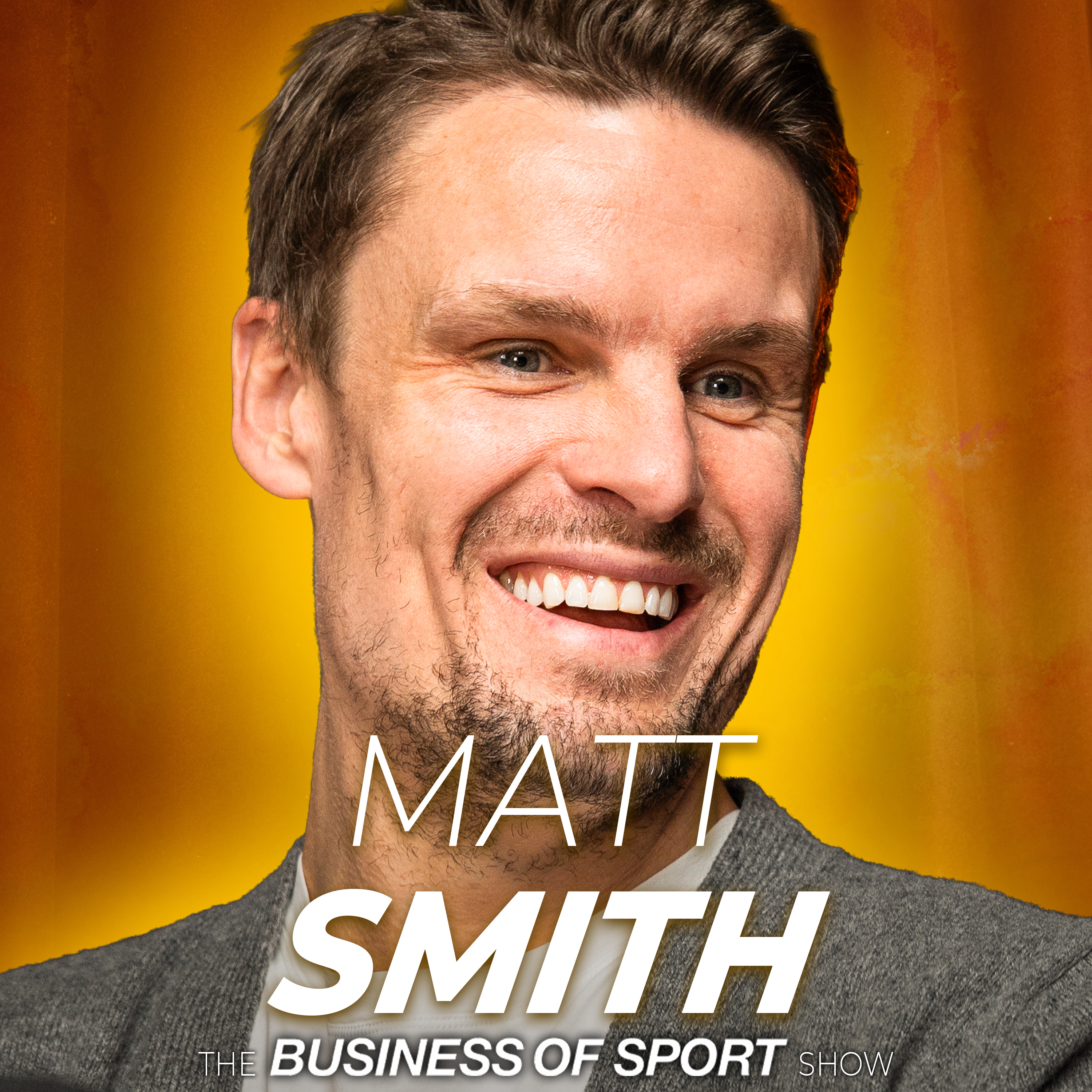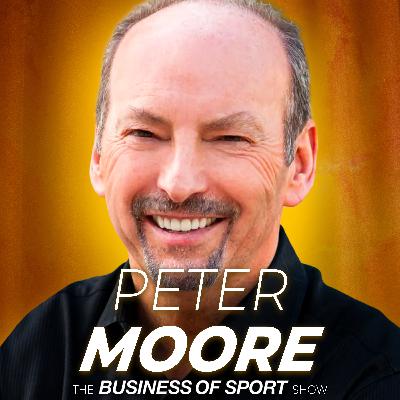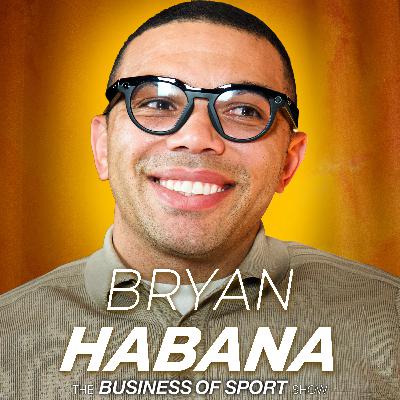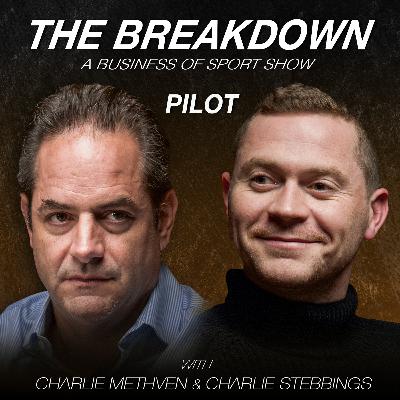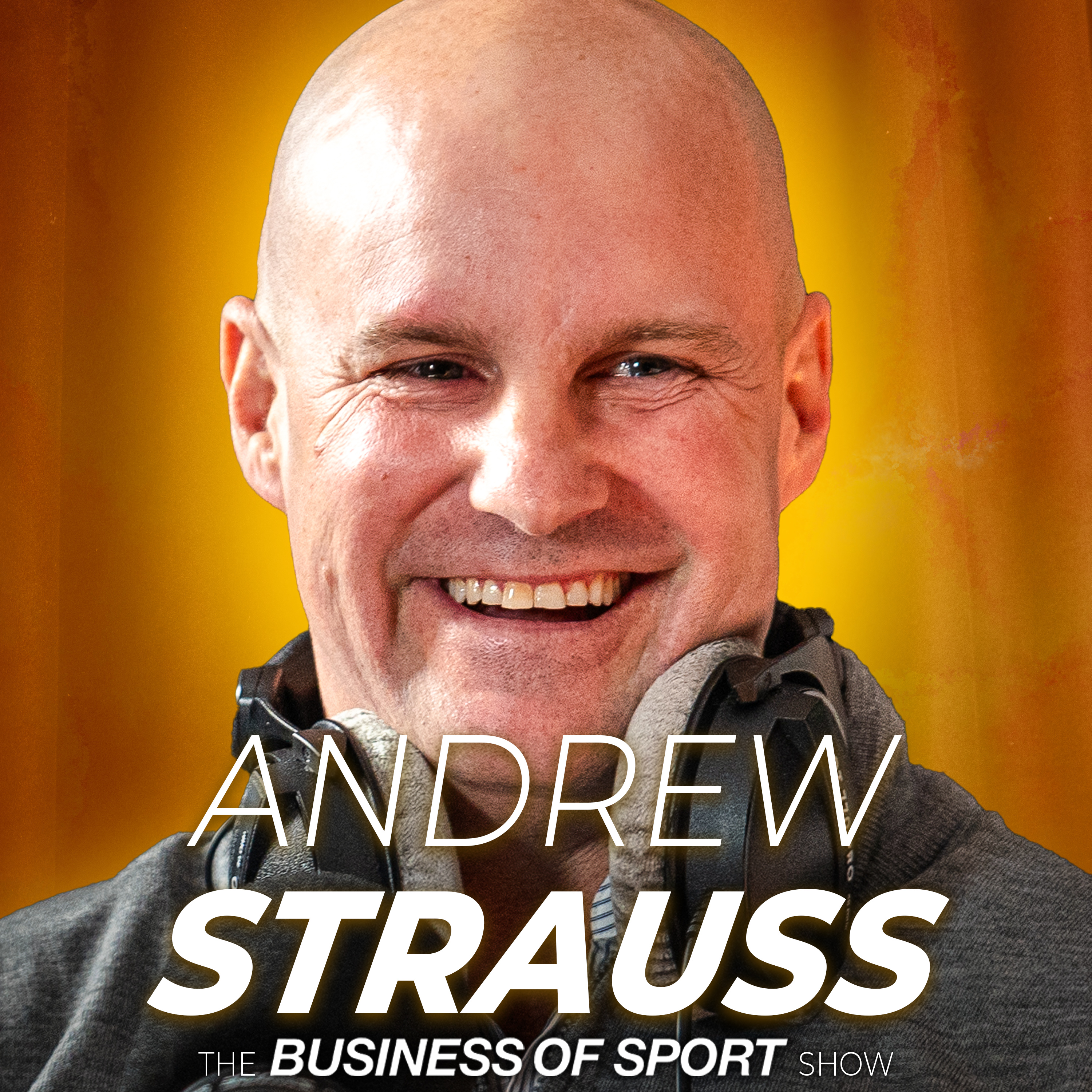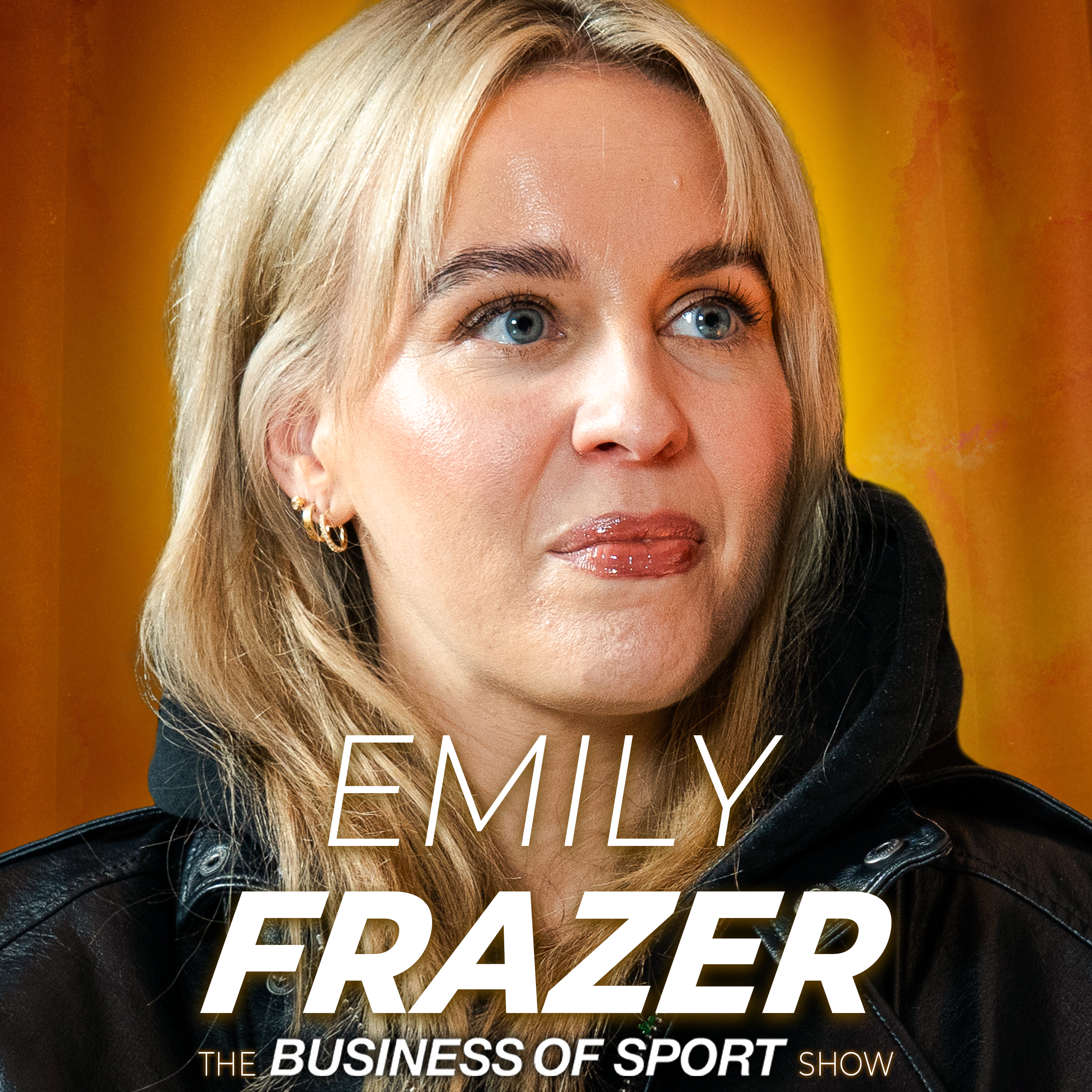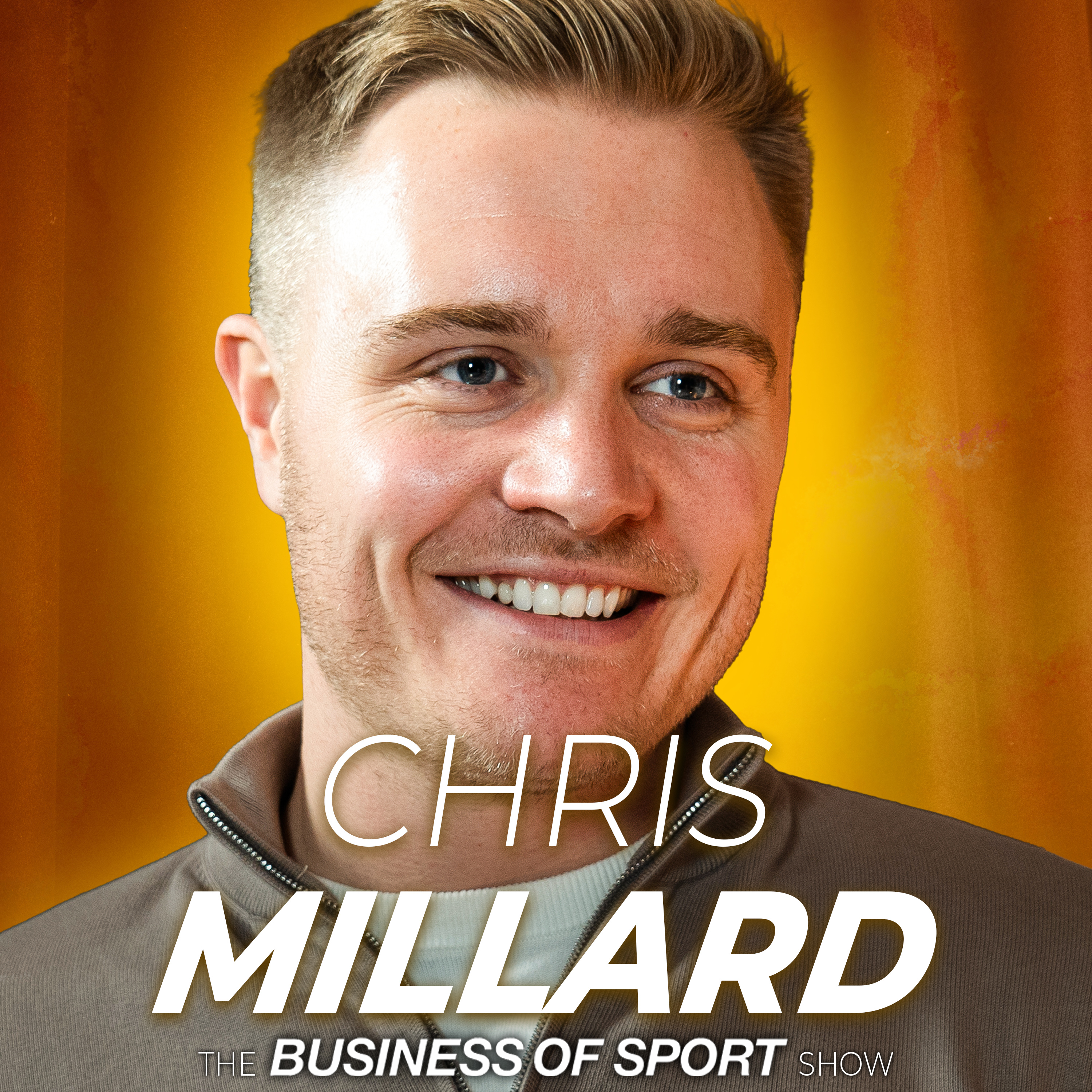Discover Business of Sport
Business of Sport

116 Episodes
Reverse
What a show we have for you this week. Leicester’s points deduction for breaching financial regulations is a big problem, but is there something far worse going on? In short, Charlie expertly takes us through how a football club goes bankrupt. Add to that the Glazer’s IPL ambitions and some excellent conversation on whether NBA Europe will get off the ground (which includes some excellent statements for those of you out there who love a good comms strategy as much as we do) and we have ourselves a Breakdown. Oh, and don’t worry, the most requested topic of the week featuring some questionable antics of male ski jumpers looking to gain more lift to travel further is covered in detail too. If you don’t know what I’m talking about, that will soon change.
It’s a return to the chair for one of our greatest guests, and what a time to do it. When Claire Williams came to see you in 2024 she delivered an account of Williams and the recent sale that few had heard. Today, we look forward. As the new season approaches, teams have had to deal with some of the biggest regulatory changes in the sport’s history. Are we about to see F1 flipped on its head? Without the pressure of having to be across every detail expected when Team Principal, Claire can take a breath and look at the sport from a different lens. Today, we, and hopefully you, are the benefiters of that. From how to prepare a car from scratch to why she thinks George Russell would be great in a McLaren (incredibly juicy we know), the educated eye once again casts a view of what could be the most dramatic F1 season on record. We’re delighted to welcome Claire to the Business of Sport.On today's show we discuss:Regulation Changes, Cost Caps and Competitive Balance:How sweeping technical regulation changes can reset the grid overnight.Why interpretation of rules and strength of engineering teams matter more than budget alone.How the cost cap has fundamentally changed the survival prospects of smaller teams.Drivers, Risk and the Harsh Reality of Performance:Why being a second driver at certain teams can be the hardest job in the sport.Making brutal decisions on drivers and why timing matters more than patience.How pressure, risk and scrutiny have intensified in the modern F1 era.Growth, New Teams and Protecting the Sport:Why Formula One is cautious about expansion despite having the money to support more teams.The balance between growth, dilution and protecting long term value.What adding new teams really means for competitive integrity.Stepping Away and Looking Back:Why leaving Williams was not a choice and how perspective changes with time.Missing the sport while recognising the toll it takes on life outside racing.Why Formula One will always be part of who she is, even from the outside.A huge thank you to our amazing partners on the show: Gemini SportsWe empower the most confident sports organisations on Earth https://geminisports.ai/SlateThe complete content creation platform for social teams https://slateteams.com/Seat Unique Discover your next premium experience businessofsport.seatunique.com
We break new ground this week. A couple of English guys taking a look at what makes the NFL so powerful on Super Bowl week. Add that to a review of challenger football leagues after Baller League paused their tournament in Germany and a look ahead to the Winter Olympics, and we have ourselves a breakdown!
The Six Nations is upon us. With the tournament kicking off this Thursday in Paris, CEO Tom Harrison stopped by to give us a rare insight into how the tournament operates behind the scenes. As the former CEO of the ECB, Tom has a lot of experience when it comes to operating in top sporting organisations. The key focus here was how rugby continues to disrupt, adapt and protect its heritage while existing in the most competitive sports environment there’s been. This was one of the first interviews Tom’s given in the position. It doesn’t disappoint. We’re delighted to welcome Tom to the Business of Sport.On today’s show we discuss: Running the Six Nations as a Global Business:Why the Six Nations is a rights and media business, not a governing body.How the role of CEO has evolved into year-round commercial and content responsibility.Balancing heritage with the need to modernise one of sport’s most traditional properties.The Nations Championship and Calendar Reform:Why a globally aligned calendar is critical for player welfare, fans and broadcasters.How the Nations Championship brings together North and South without breaking the game.The political and structural difficulty of getting unions, clubs and players aligned.Broadcast, Private Equity and Commercial Strategy:The real impact of CVC investment and why COVID accelerated outside capital.Why free to air reach still matters more than short-term rights fees.How partnerships like Guinness are built on authenticity and long-term value.Innovation, Fans and the Future of Rugby:Using data and storytelling to make rugby easier to understand and more engaging.Why rugby must embrace players, personality and always-on content.The challenge of evolving without losing what makes the Six Nations special.A huge thank you to our amazing partners on the show: Gemini SportsWe empower the most confident sports organisations on Earth https://geminisports.ai/SlateThe complete content creation platform for social teams https://slateteams.com/Seat UniqueDiscover your next premium experience https://wgl.io/s10it7
There are some big stories to look at this week: politically, commercially and socially charged. Coming up? The uncompromising behavior of Indian cricket and the chaos that has surrounded Bangladesh’s removal from the T20 World Cup asks some serious questions of the other major cricketing nations. Are English football clubs falling behind their biggest European rivals off the pitch? What does a head coach endorsing the use of TikTok amongst his players tell us about the shifting approach to how athletes as brands can still work for the performance of a team? We really got stuck into this, not much fence sitting as always. So let’s get to it. Welcome to the Breakdown.
It had to be done. It was the greatest upset in FA Cup history when Macclesfield beat holders Crystal Palace a couple of weeks ago. 117 places between the two teams in the football pyramid. But there is much more to the story than that result. A club that went out of business six years ago. An owner who was in the depths of addiction when he bought the club, now delivering one of the great football stories. Can they do it again against Brentford in a couple of weeks? You wouldn’t bet against them. But in the meantime let’s take a look at how this magic has been made possible. We’re delighted to welcome Rob Smethurst to the Business of Sport.On today’s show we discuss: The FA Cup Run That’s Changed Everything:What it meant for a sixth-tier club to beat Crystal Palace, the FA Cup holders.The financial impact of a single cup run, from gate receipts to TV money and global attention.Why moments like this can fund an entire season and transform a club’s trajectory overnight.Running a Sustainable Non-League Football Club:How you build a squad from scratch with part-time players earning a few hundred pounds a week.Why promotion often makes clubs poorer, not richer, at non-league level.How Macclesfield built a seven-day-a-week business around the club through gyms, bars, pitches and education.Turning football into part of the business, not the whole business, to survive and grow.Buying a Football Club on Rightmove:The unbelievable story of buying Macclesfield FC while in the depths of addiction and not remembering the purchase.Taking control of a club that had been stripped bare by receivers and rebuilding it from nothing.Why owning the club gave Rob purpose at the lowest point of his life and ultimately helped save it.Investment, Ambition & the Road Ahead:What it really costs to climb the football pyramid and why outside investment is unavoidable.How infrastructure underwrites club value as you move up the leagues.Why Macclesfield now has belief, momentum and a clear plan to go further.A huge thank you to our amazing partners on the show: Gemini SportsWe empower the most confident sports organisations on Earth https://geminisports.ai/SlateThe complete content creation platform for social teams https://slateteams.com/
It’s a big show this week. So much to cover, a fight as always to keep it to the point. Managers are back on the menu as we take a look at the ongoing discussion on whether power of selection should like with the head coach or the medical department. That inevitably feeds into a quick look at the chaos unleashed by Oliver Glasner in the media last weekend. It’s then the turn of tennis to celebrate the start of the Australian Open and a look at whether the Grand Slams should give a higher percentage of revenue to the players, before wrapping up with a look at F1 on the week the liveries for the 2026 season are revealed; how important is how the car looks to the brands spending tens of millions to sponsor them? Let’s get straight to it. Welcome to The Breakdown!
Elite athletes who have achieved everything in their sport while building a career alongside; it’s the ambition many sports stars have today. But how do you do it effectively? Petr Cech is a footballing legend, and I don’t use that term lightly. Four Premier League titles, a Champions League, record for the most Premier League clean sheets, and hugely respected as one of the most dedicated and attentive professionals the game has seen. He also has an MBA, is studying for a PhD, runs multiple businesses, and I need two hands to count the number of languages he speaks. The philosophy that has driven this? Win, that’s what it’s all about. If not then what’s the point. As you’ve just heard this is a theme that runs throughout. It also poses the question we wrestle most with on the show which is how to do that consistently and run a great business. I’ll get the apology in early, yes this was very exciting for me (and Harry too). Sitting across the table from someone who has given you some of your greatest memories as a fan is pretty cool, not many other ways I can say it. Just breeze through it.But what I can say is we’ve met few people are impressive or generous with their time who leave you genuinely in awe of but their successes and the processes they’ve adopted to achieve it. I promise you don’t just need to be a Chelsea fan to enjoy this. We’re delighted to welcome Petr to the Business of Sport.On today’s show we discuss: Elite Mentality, Preparation & Winning:Why preparation beats talent under pressure and how Petr approached the biggest moments of his career.What truly separates elite performers when everything is on the line.Why winning is a mindset before it’s a tactic.Leadership, Standards & Team Culture:How winning environments are built and sustained over time.The role of managers, players and dressing-room standards in elite teams.Why culture collapses when accountability disappears.Setbacks, Injury & Perspective:How a life-threatening head injury changed the way Petr approached football and life.Why fear never disappeared, but how he learned to perform alongside it.The difference between confidence and control at the highest level.From Pitch to Boardroom:Transitioning from player to executive and seeing football from the inside.Why football performance must always come before commercial priorities.How decision-making, incentives and governance shape success off the pitch.A huge thank you to our amazing partners on the show: Gemini SportsWe empower the most confident sports organisations on Earth https://geminisports.ai/SlateThe complete content creation platform for social teams https://slateteams.com/EMWA pleasure to work with leading sports & entertainment agency EMW on this showhttps://emw-global.com/
Another huge week to dissect today with a quick look back at how one of the stories in particular has developed from last week. Today it’s the turn of the chaotic world of media rights after DAZN pulled out of another league deal in Belgium, the rise of darts (at your request) and how the sport has transformed to get to where it is today, and rugby; in the wake of the challenger league R360 delaying its launch, is there even demand for a non-international rugby competition? It’s been amazing seeing the response to the show last week so a huge thank you to that. Keep commenting, keep suggesting topics, and we’ll keep tailoring it to match what you want to hear. Let’s get on with the show.
We think we know what the financial world of a footballer looks like. But the reality is very different. There is much more to understand than the salaries that media outlets publish like football scores. And if we’re honest, it’s never done to encourage a positive response. So what is the financial reality that faces some of sports most influential stars? Matt Smith played over 500 games in the Football League, for some big clubs: Leeds, Fulham, QPR, Millwall. But Matt had always had a different path to many players. He went to university, he’s done an MBA, and now has co-founded a venture capital business specifically geared towards opening up investment opportunities to athletes, but most importantly, with their best interests at heart. The fact I even need to say that is an indicator of where some of the big problems lie.This conversation was special for a number of reasons. Firstly and personally, because a conversation we had with Matt years ago was one of the first moments that triggered this show becoming a thing. Secondly, because this is a space that us, the fan and casual commentator, need to know more about. Not to mention the value this brings to any of you who are athletes facing these same situations. It’s financial reality with some quite extraordinary club stories to enjoy. On today’s show we discuss: Footballers, Money & Responsibility:Why modern players outsource too much decision-making and how that leaves them financially exposed.The illusion of wealth in football, short careers, and the pressure of lifestyle inflation.Why earning more money actually increases the need for better judgment.Agents, Advice & a Broken System:How misaligned incentives in representation quietly cost players millions.Why removing regulation turned football advice into a “wild west.”What players should demand from agents, advisors, and intermediaries.Business, Investing & Thinking Long-Term:When it makes sense for athletes to invest and when it really doesn’t.Why venture capital is a game of patience, not quick wins.Lessons from early investing successes and distorted perceptions of risk.Leadership, Transition & Life After Football:How ownership, leadership, and culture shape careers on the pitch.Why preparing for retirement matters as much as preparing for matchday.The role of curiosity, structure, and purpose in building a second career.A huge thank you to our amazing partners on the show: Gemini SportsWe empower the most confident sports organisations on Earth https://geminisports.ai/
Hello and welcome to our brand new show, The Breakdown. I’m Charlie Stebbings, and joining me on this ride is legendary sports executive Charlie Methven. With his boundless energy and unfiltered opinions, and my carefully constructed guiding influence, we’ll bring you the rundown on the week’s biggest sporting business stories. For the first show, we’re extending the timeframe slightly to cover what has happened over the holiday period, including the departures of Amorim and Maresca, Brooks Koepka’s abandonment of the once promising LIV Golf project, and of course, the conclusion of the most disappointing Ashes Tour in memory… well for me at least.This is Business of Sport: The Breakdown----------------------------------------------------Timestamps:00:00 Intro02:45 The Managerial Merry-Go-Round30:26 Saudi Investment In Elite Sport43:37 Saudi’s Attention On Golf44:44 The European Tour01:03:09 Predictions On Test Match Cricket01:05:27 Harry Brooks01:09:09 The Physical Responsibility In Cricket
What does it cost for the biggest brands to sponsor the biggest sports? Why do they do it? How do they choose what to put their name to?The money behind sport is a primary feature of the show, but it’s normally from the perspective of the sports property. How big a sponsorship can Liverpool attract and what does it do to the bottom line. So to kick off the new year, we thought we’d change that. Antoine Le Nel is the Chief Marketing Officer of Revolut, the global challenger bank now investing millions into multiple sports properties, most notably as Audi’s new title sponsor for their debut F1 season. The reasoning behind this move, a look at how brands recognise value, how they justify spend; this was all part of a fascinating insight into the inflows of sport business. And it’s not just F1: women’s football, rugby, NFL, they’re all part of the growing portfolio Revolut are leveraging to develop the business in multiple markets. Antoine’s key explanation here is telling us why sport is such a powerful way for them and other top brands to do this.On today’s show we discuss: Why Revolut Went Big in Sport:How the Audi Revolut F1 partnership came together and why F1 is a “go big or go home” sponsorship environment.How Revolut’s growth strategy shifted five years ago from pure performance marketing to building a global brand.Why sport became a critical upper-funnel lever to build credibility, open new segments, and compete with traditional banks.The NBA partnership as the proof point that sport could deliver real ROI, not just awareness.Global vs Local Sponsorship Strategy:Why Revolut splits its sports portfolio into two layers: global IPs to differentiate at scale, and local teams to drive cultural relevance.How operating in 39 markets gives Revolut a structural advantage when sponsoring truly global sports like Formula One.Why most competitors simply cannot afford global sponsorships and how Revolut “divides the cost by 20” internally.The Future of Sports Sponsorship:Why teams must evaluate partners beyond cash, focusing on long-term IP growth and innovation.How tech brands like Revolut and Spotify are reshaping how clubs think about sponsorship.Why modern sponsorship is about partnership, product and shared growth, not logos and cheques.A huge thank you to our amazing partners on the show: Gemini SportsWe empower the most confident sports organisations on Earth https://geminisports.ai/
Over the past year, we’ve gone inside football’s boardrooms, dressing rooms and balance sheets. This episode brings the most revealing moments together in one place.Welcome to The Business of Sport: Football Review.Across this compilation, we bring together the best moments from our recent football conversations to explore how money really shapes the game. From transfer fees and player contracts to ownership structures and decision-making power, this episode looks at the forces operating behind the pitch.Featuring club executives and leaders from across the football pyramid, we dig into why wages inflate faster than revenues, how promotion and relegation transform balance sheets overnight, and why running a football club is as much about survival as success.----------------------------------------------------Timestamps:00:00 Intro00:34 Peter Kenyon - Fmr CEO of Man Utd & Chelsea08:09 Liam Dooley - Shrewsbury Town CEO14:22 Rick Parry - EFL Chair24:25 Pablo Longoria - Marseille President30:09 Ryan Sparks - Bradford City CEO35:18 Ryan Bertrand - Fmr Premier League Player39:30 Spencer Owen - Hashtag Utd Owner
Today, we’re doing something a little different. Welcome to the Business of Sport: F1 Review.Over the past year, we’ve sat down with some of the most influential figures in Formula One. Team principals, world champions, and senior leaders shaping the sport behind the scenes. For this episode, we’ve handpicked the best moments from those conversations and brought them together into one definitive F1 compilation to enjoy over the festive period.Across the episode, we dive into what actually separates winning teams from the rest of the grid. From culture and leadership, to marginal gains, long-term strategy, and the human pressures that define life at the very top of motorsport.You’ll hear from voices including Nico Rosberg, Guenther Steiner, Claire Williams, James Vowles, and Zak Brown.----------------------------------------------------Timestamps:00:00 Intro00:42 James Vowles15:07 Guenther Steiner23:08 Zak Brown27:03 Claire Williams34:27 Nico Rosberg
Today, we’re going headfirst back into the world of the tier one football executive. Peter Moore is the former CEO of Liverpool, the man who oversaw the clubs return to the top of English and European football. Working alongside Jurgen Klopp from 2017-2020, this was one of the most effective ‘performance x business’ relationships in modern football. How do you win on the pitch and build value off it?Peter does not wrap his achievements in the on-field success experienced during his tenure; as you’ve just heard, it is the rediscovered affection and identity that fans found with the club that demonstrates a job well done. That’s quite an extraordinary stance for a CEO to have. Commercial maximisation and fan sentiment are hard to balance, and while there is always conflict over ticket prices or pre-season tours, we get something here which seems to recognise the importance of the club/fan relationship and asset value maximisation.An interesting time to be having this chat considering Liverpool’s recent struggles on the pitch and the Mo Salah situation, there is also plenty to go into around his role with Wrexham and the rise to prominence of football in the US. We’re delighted to welcome Peter to the Business of Sport.Timestamps:00:00 Intro06:10 Getting the Call to be Liverpool CEO09:15 "I Probably Wasn't A Good Fit For The Role"11:47 Not Involved in Football Transfers18:17 Google x Liverpool20:04 Liverpool is Immune to Winning & Losing22:23 Magic of Jurgen Klopp34:19 Funny Story: Did Liverpool Tap Up VVD?37:19 The Power of Star Players39:45 Mo Should’nt Have Said That46:53 Socialist Roots in a Capitalist Football Club52:44 Did Peter Get On With The Owners?54:13 Wrexham: Peter's InvolvementOn today’s show we discuss: How a Modern Football Club Really Works:How a Scouse kid who grew up in a pub ended up running a $7B gaming company and then Liverpool FC.Breaking down the structure: Jurgen Klopp in football, Michael Edwards on the balance-sheet, Billy Hogan on commercial, and Peter on operations.Running matchdays, hosting rival owners, managing 800 staff, and being the global face of a club with hundreds of millions of fans.Why his leadership philosophy ultimately distilled into four C’s: Community, Civic, Commercial and CultureBuilding the Liverpool Business Machine: How Liverpool rebuilt its commercial spine: CRM, global fan acquisition, digital content, funnel strategy, and personalisation.How global content like Inside Anfield reshaped the club’s relationship with 99% of fans who will never visit the stadium.Why the F&B and stadium expansion debate is about operational flow, not squeezing fans and how multi-generational matchday culture shapes decision-making.Jurgen Klopp, Culture & the Power of a Manager:The first moment he met Klopp and why he instantly thought: “This man is a modern Shankly.”Why the culture around Klopp, not individual players, is what the fans ultimately defend… including during moments like the current Mo Salah dispute.The unique Scouse belief that “the badge is bigger than any player”, and how that gives Liverpool a cultural advantage.Celebrity Ownership, Wrexham & the Power of Content:The story of how Rob McElhenney showed up at his house to recruit him for Wrexham.Why he advised them early on and helped legitimise the project, including getting Wrexham into FIFA.Breaking down what Reynolds and McElhenney get right and why content is the real multiplier modern clubs underestimate.A huge thank you to our amazing partners on the show: StrydeBringing sports investment opportunities to your door. Visit http://www.gostryde.com to become part of the movement!
Today we welcome a true sporting legend. Bryan Habana is a 100+ cap Springbok, a World Champion and joint highest tryscorer in Rugby World Cup history, a man who races cheetahs. As I’m sure you’ve noted this is our longest show yet. That is because it’s also one of the best. Rugby sits at the heart of it, but the personal stories bring a side to an elite athlete we rarely see. There are moments in this where we were shocked at what happened to Bryan and inspired by how he navigated the demands of his performance while experiencing immense personal turmoil. We sat down and kept the cameras rolling. Please excuse Harry’s dishevelled look if you’re watching; he just about made it in time out of the pouring rain, having not originally been able to make it, so we give him a pass this time. And for a bit of fun, we have a discussion debating how many global sports icons rugby has had; people that could do what Bryan did and stand alongside Thierry Henry, Roger Federer and Tiger Woods in a Gillette advert. We’re not talking legendary rugby players, we’re talking global superstars. Comment who you think sits in that category below and we can move the debate of the best answers to our socials. On today’s show we discuss: The Making of a World Champion:The discipline and sacrifice required to compete at the top for 15 years.Why Bryan believes greatness is built, not born, and the mindset that allowed him to sustain elite standards.His philosophy on resilience, humility and redefining success beyond tries, trophies and fame.Money, Trust & the Hidden Vulnerability of Athletes:The psychological crash that hits athletes after retirement and why so many feel lost without structure, identity or purpose.The shocking story of how Bryan’s trusted advisor mismanaged and spent years of his commercial earnings.The lessons he believes every young professional must learn about protecting their finances and their future.The Springboks Blueprint for Success:Why South Africa has become the most consistently dominant rugby nation in the modern era.The culture, leadership structure, and alignment that underpin the team’s identity.Rassie Erasmus’s role in transforming the Springboks and why empowerment and clarity are central to their success.The Future of Rugby:Why rugby cannot survive without global calendar alignment, better storytelling and more connection to young fans.How commercial realities, travel demands and private equity influence the sport’s next decade.Why Habana believes rugby must modernise fast or risk losing cultural relevance.A huge thank you to our amazing partners on the show: Stryde Bringing sports investment opportunities to your door. Visit http://www.gostryde.com to become part of the movement!
Hello and welcome to Business of Sport: The Breakdown, a brand new show where we will be reviewing the week’s biggest stories from sport business. Hosted by Charlie Stebbings & Charlie Methven, the former CEO of Sunderland and Charlton among multiple other roles in sport with organisations such as McLaren and The Jockey Club,The Breakdown will analyse the biggest commercial, financial, and strategic stories shaping global sports.To prepare for the full launch in January, this week we are releasing the pilot, aimed at getting this show ready to deliver for you! We want your feedback, comments, suggestions and ideas to make this the place you can get your weekly fill of the business of sport. So why are we doing this? Well as we continue to rattle on about on the interview show, the business of sport has never been of more importance or more relevance to fans, to executives, to investors, to athletes. And the current news needs a bit of digesting. We will be talking through various stories from the week, looking at takeovers, investments, governance decisions, athlete deals…you name it, we’ll talk about it.First up: - Does England’s collapse in Perth create a financial problem for cricket? - Should Ronaldo be banned for the World Cup? - Is Toto Wolff’s part sale of Mercedes a worry for F1? - What are the ramifications of Anthony Joshua’s fight with Jake Paul?This is Business of Sport: The Breakdown----------------------------------------------------In Today's Show We Discuss:00:00 Intro04:05 The Cost Of England’s Ashes Collapse 17:04 AJ + Jake Paul: Business Before Belts29:27 When Ronaldo’s Marketing Beats The Rulebook / The Ronaldo Effect 35:02 Wolff’s 15% Shake-Up: Win Or Warning
Sir Andrew Strauss is the last England Captain to win the Ashes in Australia. So what better time to get him in the hotseat. Aside from the timing being perfect, this is a show I have wanted to do from day one. That is not just because he is one of England’s greatest captains and batsmen, but he has also played an integral role in shaping the success of English cricket across formats in recent years. He transformed white ball cricket as Director of Professional Cricket at the ECB, culminating in that most incredible World Cup win in 2019. In doing so, you could say he laid the foundations for the style of test cricket the team is now playing today. We recorded this before the disaster (if you’re an England fan) that occurred in Perth, but that makes some of the frighteningly accurate observations made in this conversation more impressive. It is of course a reveal of how to win in Australia, but it is much more than that. From dealing with maverick talent to how to sort out domestic cricket, we’re delighted to welcome Andrew Strauss to the Business of Sport.Timestamps:00:00 Intro03:40 Ashes Predictions07:29 Parallels Between the 2010/11 Win and Today’s Team14:46 The Most Nervous Game17:29 Is Modern Sports Stardom Any Different Today?24:13 Breaking Down Central Contracts & Player Income27:08 Players Get More Exposure Than Ever31:12 Balancing Individual Brilliance with Team Structure34:18 How Bat Sponsorship Deals Actually Work41:33 Resetting English Cricket45:56 How Franchise Cricket Is Reshaping Test Player Pathways49:32 Is County Cricket Financially Sustainable?53:18 Why Distribution Isn’t Enough58:20 If You Had to Choose One Sports Asset to Buy01:00:41 How Athletes Transition Into Business Roles01:03:28 How Captains Balance Leadership and Individual Output01:08:00 The Ruth Strauss Foundation01:10:16 Quick-Fire RoundOn today’s show we discuss: Ashes Predictions and How To Win Down Under:The brutal realities of touring Australia. Bounce, conditions, the Kookaburra ball, and the psychological toll of playing in a “goldfish bowl.”Why England have won just one Test in Australia in 14 attempts, and why preparation is everything.The inside story of the 2010/11 Ashes triumph and what that team got right.The psychological battle of opening the batting, staying calm when the ball is flying past your ears, and facing the greatest to ever do it. Including Strauss’s unforgettable encounters with Shane Warne.Running Elite Cricket & Winning a World Cup:What Strauss changed after England’s 2015 World Cup disaster and how it led directly to the 2019 World Cup win.Why he pushed for white-ball specialists, a fearless scoring philosophy, and a total cultural reset.Inside the tensions between formats, franchise cricket, and player availability and the challenges of managing England cricket like a true performance organisation.The Hundred, County Cricket & the Future of the Game:The truth about county cricket’s finances. £40k average salaries, 450 professionals, and no sustainability.Why Strauss believes English cricket needs fewer teams, fewer matches, and an elite first division to compete globally.The insane valuations in The Hundred, why investors bought anyway, and how private capital will reshape cricket whether counties like it or not.What Test cricket will look like in 20 years.A huge thank you to our amazing partners on the show: StrydeBringing sports investment opportunities to your door. Visit http://www.gostryde.com to become part of the movement!
Emily Frazer is the CEO of Matchroom Multi Sport. She's led the charge in transforming sports like 9-ball pool into fast-growing, commercially compelling global properties, building new formats, elevating athlete storytelling, and bringing fresh audiences into what we could call a challenger landscape. The Multi-Sport story was told to perfection in the recent Matchroom Netflix series, shining a light on the lesser known side of the organisation at the centre of the boxing world and driving the boom we’ve seen in the darts. The question for Emily is simple: can the success in these other sports be replicated in the multi-sport model?Ahead of the Mosconi Cup next week at Ally Pally (pool’s answer to the Ryder Cup), Emily delivers a compelling reveal on life behind the Matchroom curtain and what it’s going to take to deliver an emerging sport on a global stage. Timestamps:00:00 Intro05:01 What is Multi Sport?16:31 How Early Opportunities Accelerate Learning20:53 How Did Matchroom Become the “Owner” of the Sport?26:35 What’s the Master Plan to Make Nine-Ball a Global Sport?31:46 Is Narrative More Important Than Quality Now?34:14 The Upcoming Mosconi Cup36:33 Do Athlete Brands Matter More Than Teams Now?40:47 Is It Truly a Viable Job for Players?44:11 Where Matchroom’s Core Revenue in Pool Comes From49:42 Should Matchroom Create a Unified Fan Loyalty Program?54:41 Pressure to Match Darts’ Success59:59 Why Pool Is More Accessible Than Snooker01:03:09 Quick-Fire RoundOn today’s show we discuss: From ‘Special Events’ to a Global Multisport Division:How a once-overlooked corner of Matchroom evolved from “the joke department” into one of the company’s fastest-growing verticals.The commercial blueprint Matchroom is applying, from multi-table events to digital-first broadcasting, social virality and new formats.The weight of carrying a whole sport on your shoulders, and why Emily believes that “80% crazy” is an essential part of the job.The belief that with the right innovation, risk, and relentlessness, Pool will become a global powerhouse.Athletes, Pressure & Player Pathways:The human realities of managing athletes in a developing sport. Expectation, frustration, and the emotional weight of leading a tour they rely on to feed their families.Why Pool is one of the rare sports where amateurs can face legends, and how that creates powerful fan moments that drive new fandom.How the rise of local ranking events has unlocked hidden talent in Vietnam, the Philippines, the U.S. and beyond.Commercial Strategy, Media & Monetisation:The economics of Pool today: ticketing, sponsorship, WNT TV, and the importance of viewership for long-term sustainability.Why Pool cannot rely on tradition or federation structures, and must innovate faster and more aggressively than snooker or darts ever did.The long-term vision: a profitable global tour, star-driven marketing, and a world where Pool sits alongside darts and snooker in Matchroom’s “big three.”A huge thank you to our amazing partners on the show: DavidGo and check out the amazing products revolutionising the protein bar at https://davidprotein.comStrydeBringing sports investment opportunities to your door. Visit http://www.gostryde.com to become part of the movement!Mosconi Cup Ticketshttps://www.alexandrapalace.com/whats-on/mosconi-cup/
IT’S ASHES WEEK. One of the biggest occasions of the sporting year is here, and with it we have a special show unlike any other we’ve done before. The Barmy Army is so influential it has made it into the Oxford Dictionary: to quote…it is a term for a group of passionate, noisy, and dedicated fans who support the English national cricket team, especially during overseas tours. For over 30 years, they’ve built incredible atmospheres by leveraging trumpets, original songs and bucket hats so fashionable they’re found all over Glastonbury. But did you know behind this infamous group sits a hugely successful business, with a responsibility to bring the best experiences to the thousands of touring fans under their banner. Chris Millard is the man in charge of the Barmy Army, and in a 6 week period that will no doubt have them front and centre of sports news as 40,000 England fans descend on Australia, we thought it was the perfect time to take a look at the organisation that defines fandom and community. This is a side of the Barmy Army you will not have seen before.It’s time to build the hype for as we enter the ultimate cricketing Christmas. We’re delighted to welcome Chris to the Business of SportTimestamps:00:00 Intro03:22 What the Barmy Army Has Planned for the Ashes09:20 What the Barmy Army Is Today12:15 The Revenue Streams14:41 How Bazball Has Boosted Test Cricket Demand16:39 How Touring Groups Collaborate in Cricket23:39 Did Commercial Growth Threaten the Barmy Army’s Values?27:07 How Barmy Army Merch & Licensing Works31:14 How Fan Culture Can Help Strengthen County Cricket34:20 Why Test Cricket Survives Only in a Few Nations37:52 How Packed Calendars Impact Player Welfare43:08 How Iconic Grounds Were Left Off the Ashes List46:03 Predicting the Ashes Outcome51:43 The Long-Term Vision for the Barmy Army BusinessOn today’s show we discuss: The Business Behind the Barmy Army:How a grassroots fan group founded in 1994 has grown into a multimillion-pound sports business.Why the Barmy Army now operates with full-time staff, global partnerships, and a sophisticated travel, merchandise, and events model.The operational challenge of managing over 3,500 official tourists, and more than 40,000 fans, on a single Ashes tour.How it evolved from a group of England fans into a global movement with over two million social followers.Partnerships & Governance in Cricket:Inside the economics of a modern fan brand. From travel packages to apparel, partnerships, and social media monetisation.How collaborations with TNT Sports, retro kit lines, and bespoke tour collections have turned the Barmy Army into a fashion and lifestyle label as much as a supporters’ group.The Barmy Army’s evolving relationship with the ECB, from being seen as a rival to becoming an ally and trusted partner.How the group now collaborates with governing bodies across the world to influence tour schedules, ticketing, and fan logistics.Test Cricket, Tourism & the Global Game:Why the Barmy Army believes Test cricket is still the sport’s heartbeat and how their tours generate up to $750 million in host-country impact.The critical link between tourism, culture, and cricket’s survival, from Barbados to the Ashes.The fight to preserve the long-form game amid scheduling chaos and private league dominance.The obstacles of perception, access, and tradition when expanding into new territories.Why the future of fandom will be driven by authenticity, emotion, and the fans who live the game, not the corporations who sell it.




